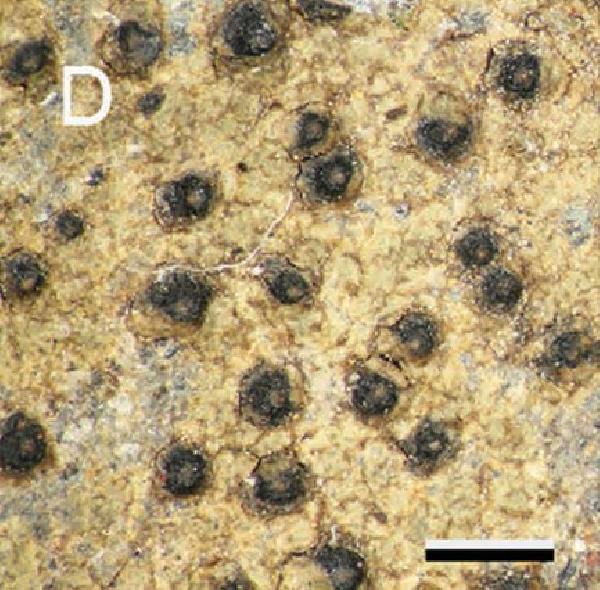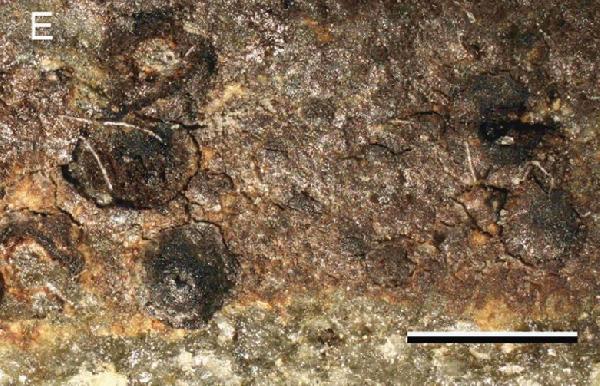Verrucaria margacea (Wahlenb.) Wahlenb.
Fl. Lappon.: 465, 1812. Basionym: Thelotrema margaceum Wahlenb. in Ach. - Meth. Lich. Suppl.: 30, 1803.
Synonyms: Lithocia margacea (Wahlenb.) A. Massal.; Verrucaria applanata Hepp; Verrucaria divergens Nyl.?; Verrucaria filarszkyana Szatala; Verrucaria leightonii Hepp non A. Massal.; Verrucaria tiroliensis Zschacke; Verrucaria vallis-flueelae Zschacke?
Distribution: N - Ven, TAA (Dalle Vedove & al. 2003, Nascimbene & al. 2007b, 2022, Nascimbene 2008b), Lomb (Nascimbene 2006), Piem (Isocrono & al. 2004), VA (Herb. Nascimbene 2138), Emil (Fariselli & al. 2020). C - Tosc.
Description: Thallus crustose, episubstratic, continuous or cracked especially around the perithecia, smooth to uneven, pale to dark brown or grey-brown, 15-70 μm thick, not distinctly subgelatinous when wet, sometimes delimited by a thin whitish prothallus. Cortex poorly developed; algal layer paraplectenchymatous; medulla poorly developed, proso- to paraplectenchymatous, without a dark basal layer. Perithecia almost completely covered with a thin thalline layer, forming 0.45-0.8(-1.3) mm wide projections, the apical part finally often naked. Involucrellum 12-40 μm thick, conical, reaching to base-level and there spreading, the space between its base and the exciple colourless or often with a dark pigment which is evenly distributed through the cell walls; exciple 0.15-0.27 x 0.16-0.33 mm, the wall colourless to brown; hamathecium of 20-40 μm long periphyses and periphysoids, interascal filaments absent; hymenial gel hemiamyloid, I+ red (I+ blue at very low concentrations of I), K/I+ blue. Asci 8-spored, pyriform to obovate, I-, fissitunicate, the wall thickened above, with an ocular chamber, dehiscent by extrusion of an endotunica to form a delicate rostrum, Verrucaria-type. Ascospores 1-celled, hyaline, ellipsoid, (20-)26-33(-41) x (8-)11-14(-18) μm. Photobiont chlorococcoid, the cells not arranged in vertical columns. Spot tests: K-, C-, KC-, P-, UV-. Chemistry: without lichen substances.Note: an amphibious freshwater lichen of siliceous rocks beside streams and lakes; it prefers constantly inundated and even permanently submerged rocks to those merely in the spray zone. The species seems to be widespread in Scandinavia and is also known from the Southern Hemisphere. The records from Emilia and Tuscany (see Nimis 1993: 743) are particularly dubious.
Growth form: Crustose
Substrata: rocks
Photobiont: green algae other than Trentepohlia
Reproductive strategy: mainly sexual
Periodically submerged (e.g. in creeks)
Commonnes-rarity: (info)
Alpine belt: extremely rare
Subalpine belt: rare
Oromediterranean belt: absent
Montane belt: very rare
Submediterranean belt: absent
Padanian area: absent
Humid submediterranean belt: absent
Humid mediterranean belt: absent
Dry mediterranean belt: absent

Predictive model
Herbarium samples

Courtesy Danièle et Olivier Gonnet - Source: https://www.afl-lichenologie.fr/Photos_AFL/Photos_AFL_V/Texte_V/Verrucaria_margacea.htm
France, 25/8/2018 - Col du Petit Mont Cenis, alt. 2200 m - Savoie


Juri Nascimbene - CC BY-SA 4.0
Stelvio National Park, Reg. Trentino-Alto Adige Prov. Trento, Italy.
07.2005


P.L. Nimis; Owner: Department of Life Sciences, University of Trieste
Herbarium: TSB (16078)
2001/12/03


Juri Nascimbene - CC BY-SA 4.0
Stelvio National Park, Reg. Trentino-Alto Adige Prov. Trento, Italy.
07.2005

Courtesy Danièle et Olivier Gonnet - Source: https://www.afl-lichenologie.fr/Photos_AFL/Photos_AFL_V/Texte_V/Verrucaria_margacea.htm
France, 25/8/2018 - Col du Petit Mont Cenis, alt. 2200 m - Savoie

Courtesy Danièle et Olivier Gonnet - Source: https://www.afl-lichenologie.fr/Photos_AFL/Photos_AFL_V/Texte_V/Verrucaria_margacea.htm
France, 25/8/2018 - Col du Petit Mont Cenis, alt. 2200 m - Savoie


Source: Thüs H., Orange A., Gueidan C., Pykälä J., Ruberti C., Lo Schiavo F. & Nascimbene, J. (2015) Phytotaxa 197(3): 161-185 Revision of the Verrucaria elaeomelaena species complex and morphologically similar freshwater lichens (Verrucariaceae, Ascomycota).
Specimen Thüs W Ice016 of Verrucaria margacea (BM). Scale bar: 1 mm


Source: Thüs H., Orange A., Gueidan C., Pykälä J., Ruberti C., Lo Schiavo F. & Nascimbene, J. (2015) Phytotaxa 197(3): 161-185 Revision of the Verrucaria elaeomelaena species complex and morphologically similar freshwater lichens (Verrucariaceae, Ascomycota).
Isotype of Verrucaria margacea (W). Scale bar: 1 mm
Growth form: Crustose
Substrata: rocks
Photobiont: green algae other than Trentepohlia
Reproductive strategy: mainly sexual
Periodically submerged (e.g. in creeks)
Commonnes-rarity: (info)
Alpine belt: extremely rare
Subalpine belt: rare
Oromediterranean belt: absent
Montane belt: very rare
Submediterranean belt: absent
Padanian area: absent
Humid submediterranean belt: absent
Humid mediterranean belt: absent
Dry mediterranean belt: absent

Predictive model
| Herbarium samples |

Courtesy Danièle et Olivier Gonnet - Source: https://www.afl-lichenologie.fr/Photos_AFL/Photos_AFL_V/Texte_V/Verrucaria_margacea.htm
France, 25/8/2018 - Col du Petit Mont Cenis, alt. 2200 m - Savoie


Juri Nascimbene - CC BY-SA 4.0
Stelvio National Park, Reg. Trentino-Alto Adige Prov. Trento, Italy.
07.2005


P.L. Nimis; Owner: Department of Life Sciences, University of Trieste
Herbarium: TSB (16078)
2001/12/03


Juri Nascimbene - CC BY-SA 4.0
Stelvio National Park, Reg. Trentino-Alto Adige Prov. Trento, Italy.
07.2005

Courtesy Danièle et Olivier Gonnet - Source: https://www.afl-lichenologie.fr/Photos_AFL/Photos_AFL_V/Texte_V/Verrucaria_margacea.htm
France, 25/8/2018 - Col du Petit Mont Cenis, alt. 2200 m - Savoie

Courtesy Danièle et Olivier Gonnet - Source: https://www.afl-lichenologie.fr/Photos_AFL/Photos_AFL_V/Texte_V/Verrucaria_margacea.htm
France, 25/8/2018 - Col du Petit Mont Cenis, alt. 2200 m - Savoie


Source: Thüs H., Orange A., Gueidan C., Pykälä J., Ruberti C., Lo Schiavo F. & Nascimbene, J. (2015) Phytotaxa 197(3): 161-185 Revision of the Verrucaria elaeomelaena species complex and morphologically similar freshwater lichens (Verrucariaceae, Ascomycota).
Specimen Thüs W Ice016 of Verrucaria margacea (BM). Scale bar: 1 mm


 INDEX FUNGORUM
INDEX FUNGORUM
 GBIF
GBIF
 DOLICHENS
DOLICHENS




